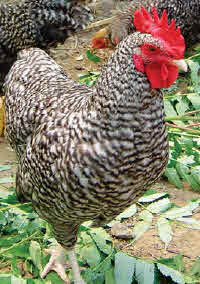



Strength in Numbers Achieves Sustainability
Farms in China are demonstrating that community-supported schemes provide a more sustainable alternative to industrial agriculture, according to Model Farm Project.With issues of food security, climate change and depleting natural resources fast taking centre stage, the call for sustainable food production has never been louder. Community-supported agriculture (CSA) could provide a viable solution. Emerging in the 1960s, CSA was a response to concerns regarding the urbanisation of agricultural land and use of pesticides, herbicides and antibiotics in farming. Focusing on supporting communities and enhancing levels of consumer-producer trust, it constitutes a move away from industrial agriculture and towards a reconnection with food.
* "The call for sustainable food production has never been louder" |
In essence, CSA schemes consist of a community of individuals who pledge to support a farming operation by paying for produce in advance. Growers and consumers provide mutual support, sharing the risks and benefits of small-scale, local, food production.
Vegetables and fruit are the most common crops, typically grown on small, independent, family farms. Dairy, eggs and meat products may also be offered. Food is delivered or collected, usually weekly, but rather than buying products at predetermined prices, CSA members only receive what the farm successfully harvests, thus sharing the ‘growing risk’ with the farmer. For example, if the strawberry crop is unsuccessful, customers receive fewer strawberries but if, say, the potato crop has been good, they will receive more potatoes instead.
The Model Farm Project (MFP) is a partnership between the World Society for the Protection of Animals (WSPA) and the Food Animal Initiative (FAI) and promotes CSA schemes within its international network of ‘viable, humane and sustainable model farms’. It does so due to the numerous ‘sustainability benefits’ of CSA.
| CSA: Key Benefits | |
|---|---|
| Benefit | CSA Approach |
| Economic stability | By providing a guaranteed market through prepaid annual sales, consumers help finance farming operations |
| Environmental sustainability | The majority of CSA schemes practice ecological, organic or biodynamic agriculture, avoiding pesticides and inorganic fertilisers. This benefits the environment, as does the reduction of carbon dioxide emissions due to transportation. |
| Animal welfare | With CSA, there is often the belief that healthy animals make for healthy eating. Thus animals have access to outdoors or space to perform natural behaviours. At Little Donkey Farm, for example (see below), there is no tail docking or tooth clipping and a deep litter pig system provides pigs with room to root, forage and create wallows. The litter is also used as compost. |
| Provenance and produce quality | As produce only travels short distances to reach the consumer, it is therefore fresh and of known and trusted origin. |
| Strong consumer-producer relationships | CSA members are often actively involved in the growing process, encouraged through newsletters and recipe sharing, farm visits and food collection. |
| Adaptability | CSA schemes can be tailored to meet the needs of the producers and consumers in question, in terms of how production is supported and produce is delivered. For example, payment may be made annually for set weekly deliveries or produce can be delivered until this 'credit' runs out, much like 'pay-as-you-go' mobile phone schemes. |
Community Agriculture in Practice
Three CSA schemes within the MFP network; all are based in Beijing, China, and focus on antibiotic and pesticide-free, low-input production, with a reliance on nutrient recycling.
Little Donkey Farm, Haidian District, Beijing

This 15-hectare farm is operated by the Haidian Government and representatives of Renmin University of China and run by the Green Ground Eco-Tech Centre. The CSA programme launched in 2009 and approximately 250 families buy vegetables on a weekly basis, with eggs and pork also available. There are also ‘self-farming’ customers who grow produce on rented 30-square metre plots. Annual per-plot fees include seeds, compost, tools and growing advice. As well as receiving fresh, organic, vegetables, customers can support and protect local agriculture and farmland.
For more information on Little Donkey Farm, click here.
Green Cow Farm, Xibaixinzhuang, Shunyi Beijing

The CSA scheme at Lejen Chen and Shan En’s six-hectare farm has run for approximately seven years. Twenty members receive boxes of vegetables on a weekly basis. Eggs and milk are also available and produce is used in the nearby restaurant, Mrs Shanen’s. The farm is home to 17 pigs, eight cows, 16 geese and more than 200 chickens. Members help with weeding, farm work and events.
According to Mrs Chen, this provides a connection with nature and the animals, fostering a greater appreciation for food. “Members now see the ‘cultural’ aspect of agriculture,” she says.
For more information on Green Cow Farm, click here.
Bejing God’s Grace Garden Plantation, Fangshan District, Beijing

Therese Rose Zhang’s 10-hectare farm is certified organic and a member of IFOAM. The CSA scheme began approximately 10 years ago. Mrs Zhang has 10 cows, 12 goats, 400 laying hens, 200 ducks and 50 geese. She sells vegetables, eggs and milk to up to 50 regular customers on a weekly basis. Each customer pays in advance, drawing down against this credit.
“I like the fact that I can exchange my produce directly with clients,” says Mrs Zhang. “In return, they can get fresh produce with the best flavour and can also visit my farm.”
For more information on Bejing God’s Grace Garden Plantation, click here.
MFP and CSA: The Future

The MFP works with individual farms to improve animal welfare and production efficiency by providing advice regarding vaccination, nutrition, housing and through tailored animal welfare training. The approach is farm-focused and very much a two-way learning process. The MFP also provides an independent assessment of the farms, which helps improve consumer trust.
Through its work, the MFP has identified the potential and need for continued growth of CSA, both within China, with its largely agriculture-reliant population, fast-growing middle class and increasing livestock consumption, and elsewhere. The MFP is now concentrating on building a network of farmers in order to promote humane and sustainable farming among consumers and within the agricultural community.
May 2011








